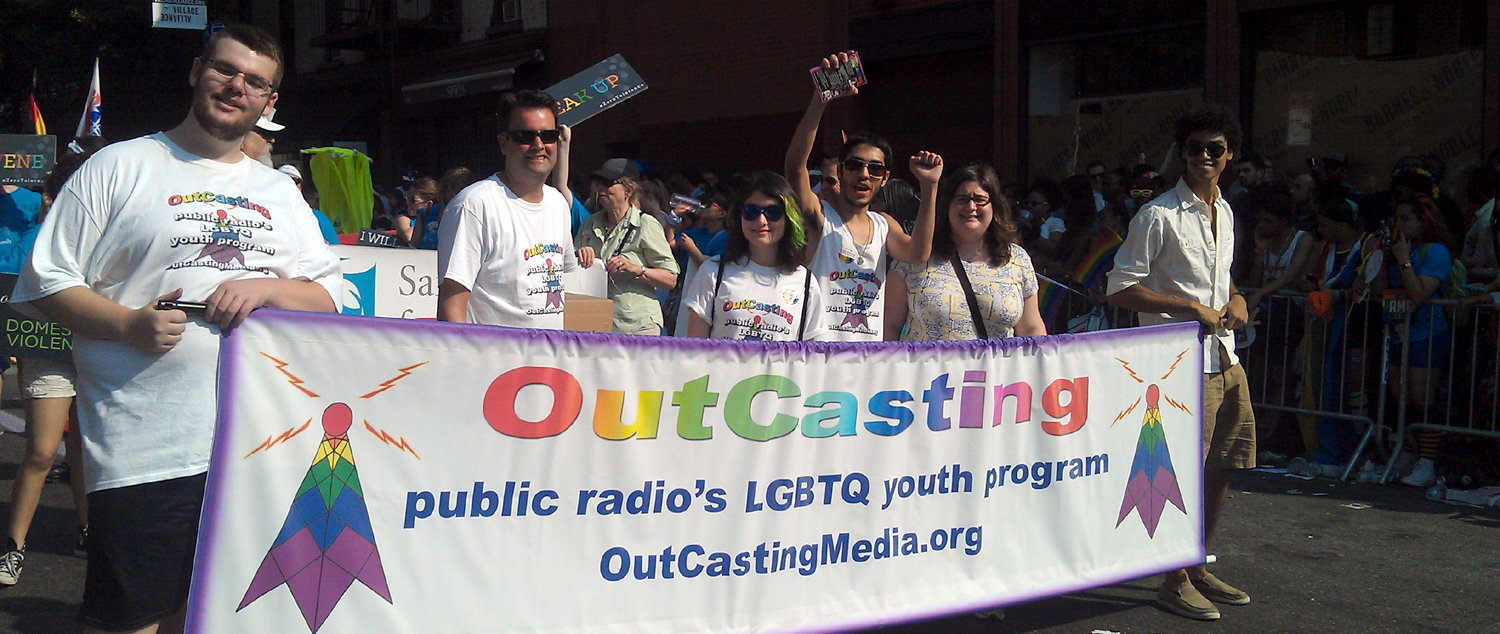
June 29, 2014 | OutCasting marched in the NYC Pride March with an estimated 14,000 marchers and 2,000,000 spectators. Photo: OutCasting
By LQBTG Youth, for A You
Sit back for a moment, and recall your adolescent years. Put on your old sneakers, recall the friendships you made and lost. Remember the times you faced rejection in any way during that time. Were you rejected by a crush, your parents, or a group? Did someone pull a baton switch on a sleepover? Remember that feeling that your entire world is crashing ungracefully into a black hole.
There is legitimate science behind those end of the world feelings from rejection, particularly that unique intensity felt during adolescence. Our reptilian brain adopted a fear of rejection, since to be cast out from the tribe generally meant you were eaten by something. Now add the soup that is the rapidly growing and changing teenage brain, and you’ve got a view of the world full of intense color and fire.
It’s one thing to be an adult in the LGBTQ community and going through a world of rejection. It’s quite another to be facing the same things while experiencing rapid physical, mental, and emotional changes. According a 2015 survey by the Center for Disease Control, “…LGB students were 140% more likely to not go to school at least one day during the 30 days prior to the survey because of safety concerns, compared with heterosexual students.” This population is also at a greater risk for depression and suicide.
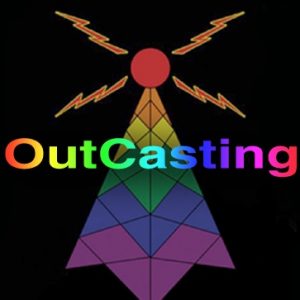 OutCasting is an issue-oriented radio and podcast program that looks at LGBTQ issues through the eyes of young adults. Founder and executive director Marc Sophos has found that the youth perspective on LGBTQ issues is sorely lacking in the media. He has found that mainstream media tends to talk a lot about the tragedy of an event while skimping on the issues.
OutCasting is an issue-oriented radio and podcast program that looks at LGBTQ issues through the eyes of young adults. Founder and executive director Marc Sophos has found that the youth perspective on LGBTQ issues is sorely lacking in the media. He has found that mainstream media tends to talk a lot about the tragedy of an event while skimping on the issues.
“The only time you ever hear of [LGBTQ youth] is when they kill themselves. You have all the shock value and then they’re off to their next story…you don’t see a discussion of any intelligence.”
A Space to Grown, Learn, and Accept
Marc created OutCasting to be a space of exploration and growth for youth of all sexualities, including those who identify as heterosexual.
“We’re a relatively small minority [and] to have straight allies is essential to any civil rights gains that we make. Straight allies have perspectives on LGBTQ issues, even though they may not be as personally touched as someone who is LGBTQ. They have thought of these issues, learned about them, [and] want to talk about them.”
The name “OutCasting” is a play on three different words; to be “out,” the feeling of being an “outcast” in one’s society, and the application of both these concepts to “broadcasting” and “podcasting.” The OutCasters, as producers are known, have interviewed a number of influential leaders and supporters of the LGBTQ community. One of their more memorable interviews included Gilbert Baker, the creator of the rainbow flag. Baker spoke with OutCasters only a month before he died unexpectedly in his sleep on March 31, 2017. The two-part series aired on Sprouts June 14th, and June 21st, 2017
Heterosexual people are generally born already in a state of belonging. Their tradition is maintained by the elder to child relationship. However, those who identify with the LGBTQ community are not necessarily born into gay parents. They are often unfamiliar of their own story, as schools often neglect teaching this part of history. These young adults are often unaware of the Civil Rights struggle that has been happening since the 1950s. “We are our own tribe. We have to find it.”
“It’s amazing for them to discover…that they stand on the shoulders of gay men and women and transgender people who fought for these rights, who fought for it to be easier for them.”
In December 2010, then Senator Mark Leno introduced a bill to the California Senate that would compel California public schools to teach the history of underrepresented communities. This would include those associated with LGBTQ, disabilities, and various ethnic groups and communities. The bill was passed and signed into law in 2011, and in 2016 the California State Board of Education updated its History–Social Science Framework for California Public Schools. This update provides the framework for how the law will end up in the curriculum. You can find reporting and conversation with Mark Leno in episodes 10 and 14a of OutCasting.
“When we talk about [LGBTQ and disability] history, it’s suppressed. It’s consciously excluded from school curriculum. As [Mark Leno] puts it; people learn about a man who advocated for his people, was assassinated for his efforts, and his name was Martin Luther King, Jr. But we don’t learn about Harvey Milk.”
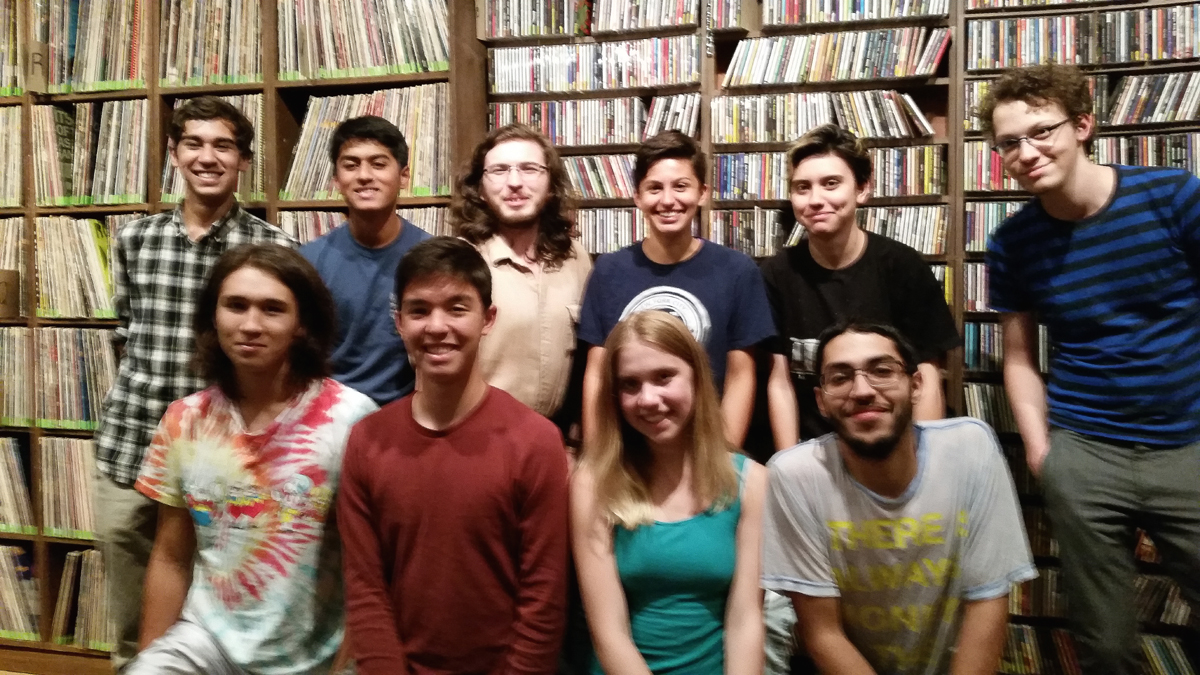
All OutCasting youth participants unless otherwise noted. Front Row: Max, Alex, Callie, Assistant Producer Josh Valle. Back row: David, Dhruv, Assistant Producer Alex Mintz, Andrea, Nicia, Dante. At OutCasting’s studio in Westchester County, NY.
A Sudden Change in Community
What happens when you are suddenly a part of a community that you didn’t realize before? As we have seen recently with white supremacists with results of their DNA tests, you could reject it, or come up with a repair response. For white supremacists they now have to deal with being a part of a culture that they have spent so much energy hating. Marc has found that young adults in a state of open mindedness and sympathy makes it easier to accept others or even transition.
“One straight ally developed feeling for another girl [in college]. It was OutCasting that made it easy for her…to accept this new knowledge that she [is] bisexual. I hear stories like this and it touches my heart. I wish this existed when I was growing up. Being LGBTQ, coming out is never easy. I like to think that we can be a resources for the audience and for those who work on the show.”
The Grassroots Media Family
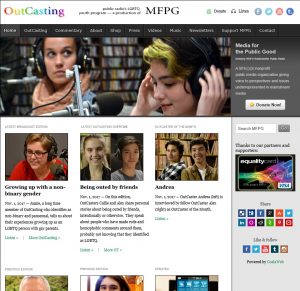 OutCasting comes from a family tree of community radio and grassroots broadcasting. WDFH 90.3 FM was the only public radio station in New York’s lower Hudson River valley. The station ran a non-profit organization called Hudson Valley Community Radio, Inc., which is now the Media for the Public Good (MFPG). OutCasting debuted in 2011, and when WDFH went off the air in 2013, MFPG decided to focus on OutCasting. It became the mission of the organization to “give a national voice to LGBTQ youth, train a new generation of media activists, and contribute to our national discussion of LGBTQ issues.
OutCasting comes from a family tree of community radio and grassroots broadcasting. WDFH 90.3 FM was the only public radio station in New York’s lower Hudson River valley. The station ran a non-profit organization called Hudson Valley Community Radio, Inc., which is now the Media for the Public Good (MFPG). OutCasting debuted in 2011, and when WDFH went off the air in 2013, MFPG decided to focus on OutCasting. It became the mission of the organization to “give a national voice to LGBTQ youth, train a new generation of media activists, and contribute to our national discussion of LGBTQ issues.
“The purpose of [the founding document] was to focus what kinds of ideas I had at the time for what we could become. My main concern was how we can get the kids. The old, inaccurate, stereotype is that gay people can’t reproduce so they recruit. It’s totally nonsensical, but here I am, a gay man going to schools to recruit kids for the program. I thought it would be an issue but it wasn’t.”
In 2013, OutCasting became network member of the Pacifica Radio Network.
“Pacifica gave us a platform to establish ourselves as a national program. I think if we were just a single station program, I don’t think we would have gotten the kind of access to these high profile guests that we’ve gotten. Now we’re just getting into the process of offering to stations through PRX. But Pacifica is our home. It wouldn’t have gone the way it did without the marvelous support from Pacifica.
“I could go on for days on the wonders of Pacifica.”
Sprouts: Radio for the Grassroots
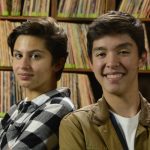 Outcasting sends Pacifica their monthly episode to be aired on Sprouts. Check our Sprouts map to find a community radio near you that airs it regularly. If they don’t, tell them to consider it! Find an archive of all past shows on Pacifica’s SoundCloud.
Outcasting sends Pacifica their monthly episode to be aired on Sprouts. Check our Sprouts map to find a community radio near you that airs it regularly. If they don’t, tell them to consider it! Find an archive of all past shows on Pacifica’s SoundCloud.
Be sure to tune in this week for a new episode of OutCasting titled, “Growing Up a Non-Binary Gender.”
